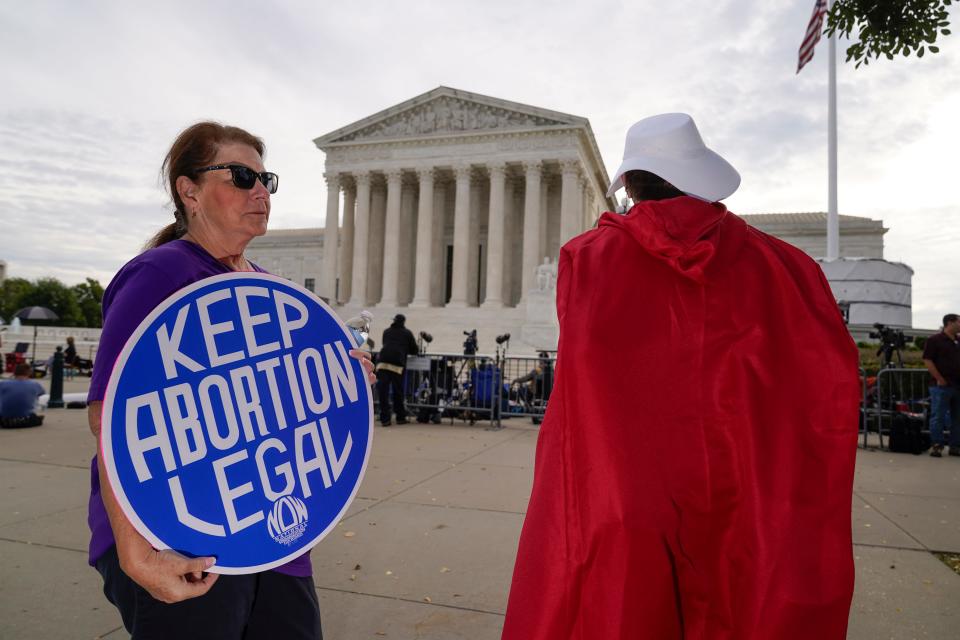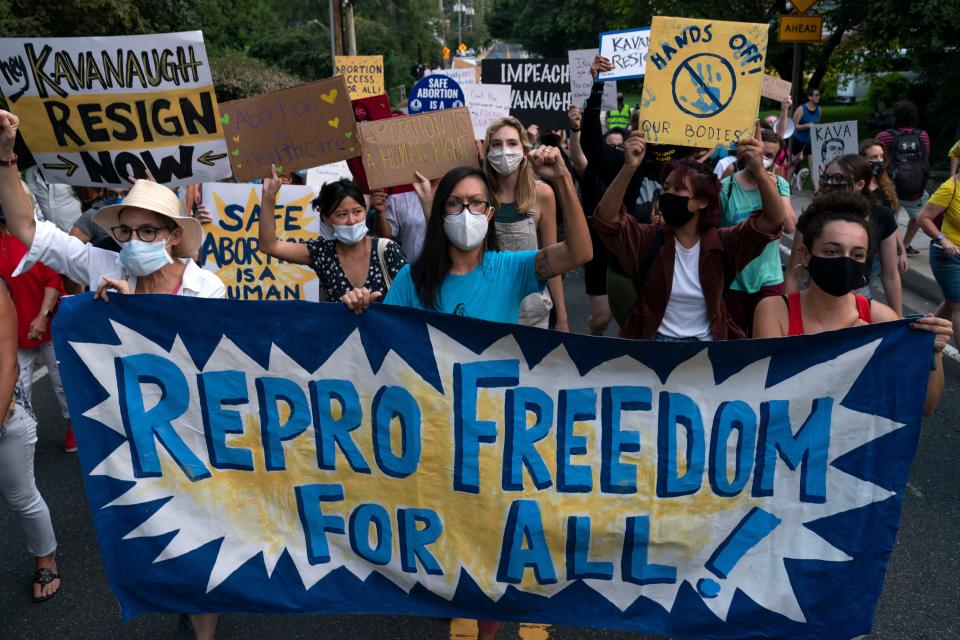'Above the partisan divide'? Supreme Court begins heated new term amid slipping support
- Oops!Something went wrong.Please try again later.
- Oops!Something went wrong.Please try again later.
WASHINGTON – The Supreme Court kicked off a politically fraught new term on Monday even as the justices continue to grapple with fallout from the last one.
With abortion, gun rights and religion featured prominently on the docket in coming weeks, the high court is diving into culture war controversies as several of the justices have fanned out in recent weeks to publicly defend against criticism on the left, sinking approval ratings and a bevy of proposed structural changes.
A string of rulings over the summer that aligned with Republican positions on immigration, voting rights, the eviction moratorium and other contentious issues has prompted questions about whether the 6-3 conservative majority is yanking the court to the right or easing it in that direction more incrementally, as in the past.
"This term will prove to be a real test of whether the Supreme Court can rise above the partisan divide that has afflicted virtually every other institution in our democracy," said David Cole, national legal director of the American Civil Liberties Union.
"The court's legitimacy rests on their being able to do that."
Eight of the nine justices returned to the courtroom Monday to hold in-person oral arguments for the first time since the coronavirus pandemic began, delving into two cases. Associate Justice Brett Kavanaugh, who tested positive for COVID-19 late last week but is vaccinated and not showing symptoms, took part in the arguments remotely.
More: Supreme Court returns to the courtroom for first time since pandemic began
Alito: Supreme Court Justice Alito fires back at criticism of 'shadow docket'
In the weeks leading up to the new term, at least four justices spoke up publicly to argue that partisanship doesn't factor into their interpretation of the law. Associate Justice Samuel Alito, speaking to the Notre Dame Law School last week, specifically focused on three recent rulings from the court's expedited or "shadow" docket – all of which went against the positions held by President Joe Biden, a Democrat.
On Aug. 26, the court shot down Biden's COVID-19 eviction moratorium, following through on an implied threat that a majority would not support another extension of the freeze absent approval from Congress. Two days earlier it said the administration did not properly unwind a Trump-era policy requiring Central American migrants seeking asylum in the United States to remain in Mexico while their cases are processed.
If those rulings flew under the nation's collective radar over the summer, the 5-4 decision on Sept. 1 allowing Texas' ban on most abortions after six weeks to remain in effect – at least for the time being – refocused significant attention back on the court, prompting multiple congressional hearings and rousing supporters of abortion rights.
"In the ... three recent cases that have stimulated most of this criticism, perceptive and fair-minded readers could easily understand the grounds for our ruling in all of those cases," Alito said. "You can disagree with those grounds, but that's another matter."
Days earlier, speaking at an event celebrating the 30th anniversary of the opening of the McConnell Center at the University of Louisville, Associate Justice Amy Coney Barrett, the most junior of the nine justices, told a crowd of more than 100 people that her goal was to "convince you that this court is not comprised of a bunch of partisan hacks."
Longtime observers say the new term will likely stress test Chief Justice John Roberts' desire to ensure the court maintains its legitimacy with Americans of every political persuasion.
"Ever since he became chief he's emphasized the importance of the court rising above partisanship," said Jeffrey Rosen, president of the National Constitution Center. "And since the legitimacy of the court is highly responsive to whether people approve of its decisions, this term, where people will be paying such close attention to the abortion and guns decisions, will certainly test that vision."

Slipping support
A series of polls over the summer that showed slipping support for the court has added fuel to questions about its standing with the public. Nationwide approval of the Supreme Court fell to 49% in September, down from 60% two months earlier, according to a Marquette University Law School poll published last month. That drop, consistent with findings in other polls, was driven by a nosedive in support among Democrats after the Texas ruling.
There is still a debate underway about the last term, which ended in July. A number of unanimous outcomes or unusual splits suggested a court that wasn't as rock-ribbed conservative as some had warned it would be. After all, a 7-2 majority rejected the latest challenge to Obamacare, and Barrett signaled her fidelity to precedent in a blockbuster case pitting LGBTQ rights against religious freedom claims.
Cole, with the ACLU, said the court "largely succeeded" in avoiding the partisan fray last term.
But then on the previous term's final day the court handed down a pair of 6-3 rulings that undermined the narrative of a moderate court. In one, the conservative majority significantly undermined the ability to bring lawsuits under the 1965 Voting Rights Act. In another, it struck down a California requirement for nonprofits to disclose large donors.
Many progressives took to social media to post "told you so" missives.
That dynamic played out as Biden's commission to study structural changes to the court – including the idea of term limits or adding to the number of justices – held hours of hearings. The group is poised to release its report later this fall. A number of Democratic proposals to change the court, meanwhile, have floated around in Congress.
Poll: Democratic support for Supreme Court plummets after Texas decision
Jacobson: Biden vaccine plan for employers raises legal questions over mandates
Even progressive groups that support growing the court's size have mostly dismissed the notion that the commission's report will lead to substantive changes.
All of that has led some conservatives to suggest that the fury aimed at the court in recent weeks and questions about its impartiality are, in fact, a reaction to decisions disliked by progressives, and an effort to influence outcomes in future cases.
"This is part of a concerted effort, really a shameful broadside on the part of our Democratic colleagues, to attack judicial independence," Sen. John Cornyn, R-Texas, said during a Senate Judiciary Committee hearing last week focused on the court's expedited docket and its decision in the Texas abortion case. "It's clear that this is part of a concerted effort to intimidate and bully the members of the Supreme Court."
Alito raised a similar point last week, arguing the recent criticism amounts to an effort to "intimidate the court or damage it as an independent institution."

Looking ahead
Debate over the Supreme Court's direction seems likely to be amplified in the weeks ahead, as the justices consider a potentially blockbuster challenge to Mississippi's ban on most abortion after 15 weeks of pregnancy. Unlike the Texas case, the appeal from Mississippi speaks directly to whether pre-viability bans on abortion are constitutional.
In briefs filed over the summer, Mississippi explicitly asked the Supreme Court to overturn its 1973 decision in Roe v. Wade and a subsequent ruling in 1992 that guaranteed a right to an abortion up until the point a fetus can survive outside the womb, about 24 weeks. Abortion rights groups pleaded with the court to honor those precedents or risk its reputation as the least political branch of government.
That case is Dobbs v. Jackson Women's Health Organization.
"Critics said if you confirm Justice Barrett that she and the conservatives are going to join to strike down the ACA. Of course that didn’t happen, but now the same people see the sky falling again in Dobbs," said Jeffrey Wall, an appellate attorney and former acting solicitor general. "Let’s see what happens there and how it drives the narrative for the court this term.”

The justices also will decide whether New York's stringent requirements to carry a concealed handgun in public survive scrutiny under the Second Amendment. They also will consider several challenges to regulations that religious groups say infringe on their First Amendment right to practice their faith without government intervention.
The court agreed last week to decide whether Boston may deny a Christian group the right to raise a flag at City Hall alongside non-religious groups. It also will hear a lawsuit brought by Sen. Ted Cruz, R-Texas, challenging federal campaign finance rules that restrict a campaign's ability to raise money to repay a candidate's personal loan.
Those cases and others will provide insight into the direction the court is headed, but close observers said they may not fully resolve the questions raised in recent months.
"As happened last term, we could see cases that are decided along ideological lines while seeing other cases that surprise observers by not being decided in the expected ways or along the expected lines,” said Joseph Palmore, an appellate attorney who has argued at the Supreme Court a dozen times.
This article originally appeared on USA TODAY: Supreme Court starts new term as abortion, gun cases threaten image

